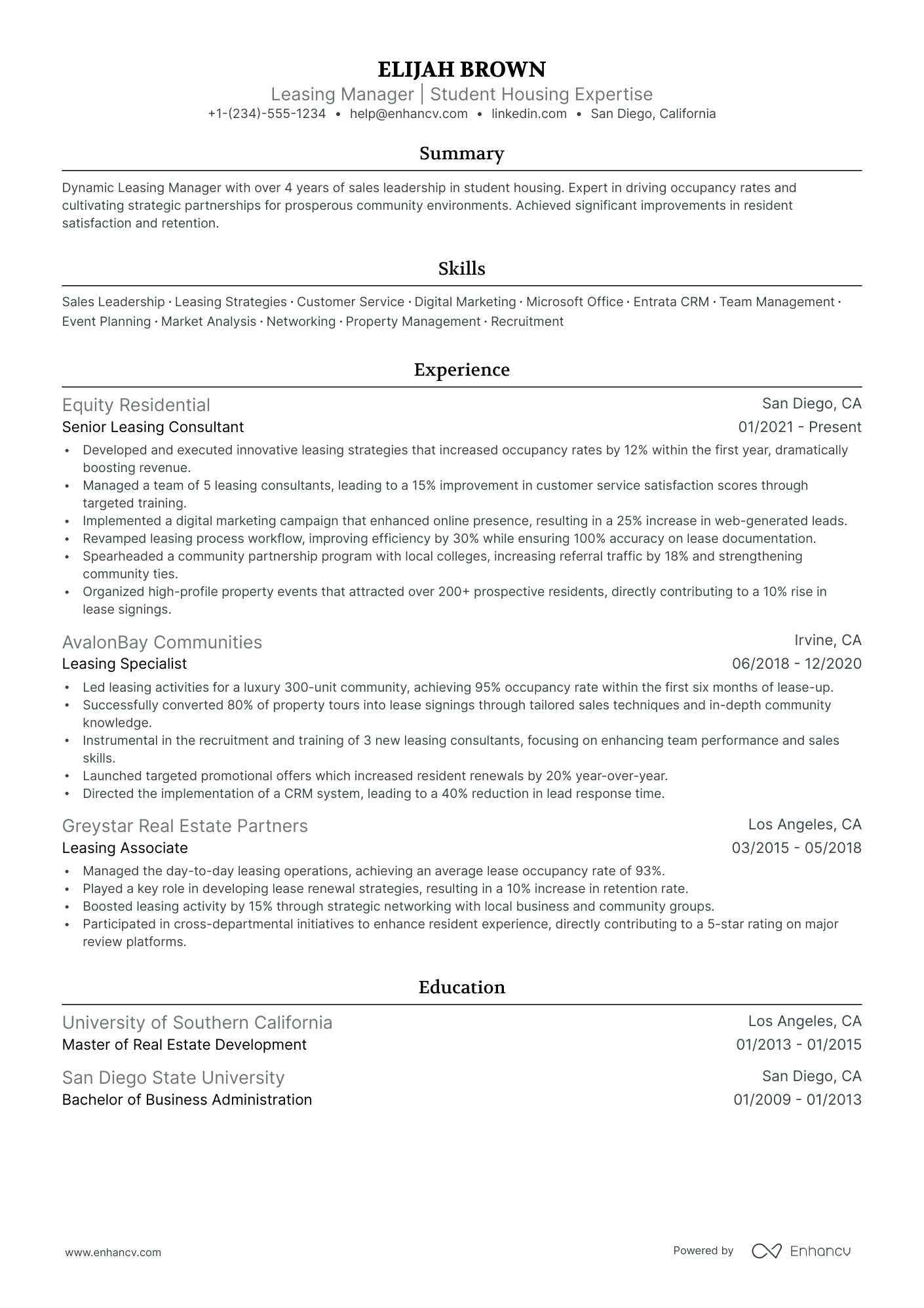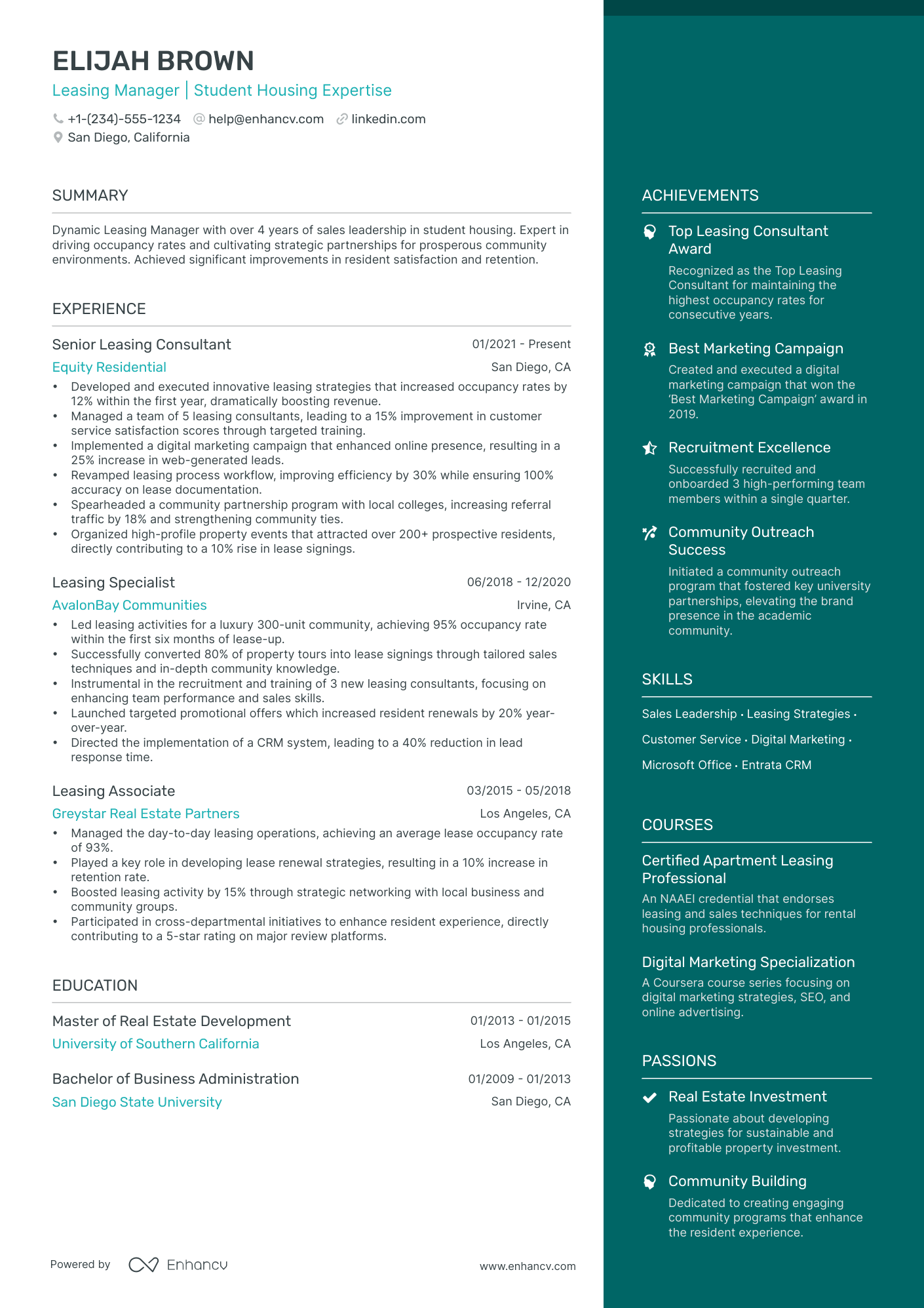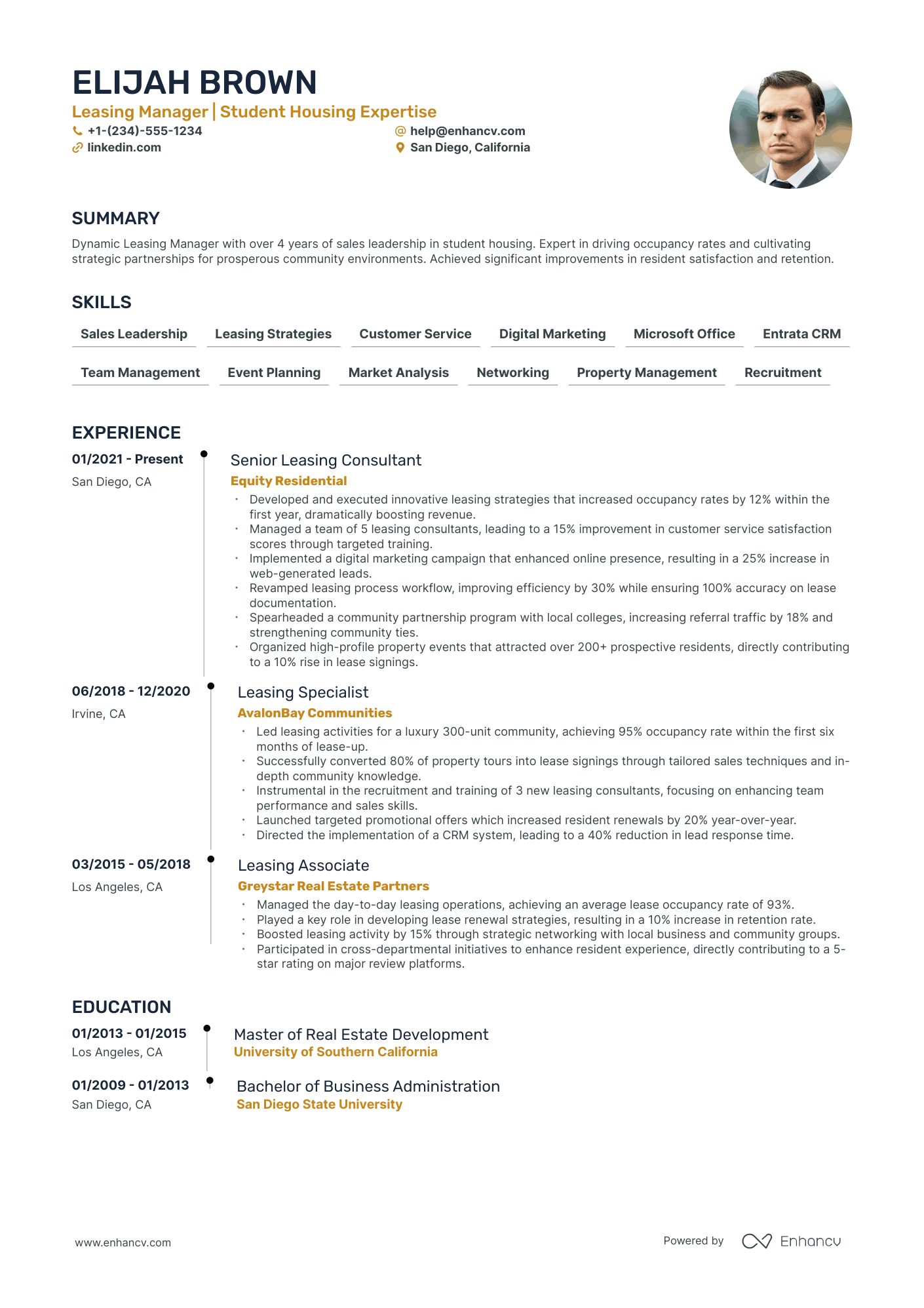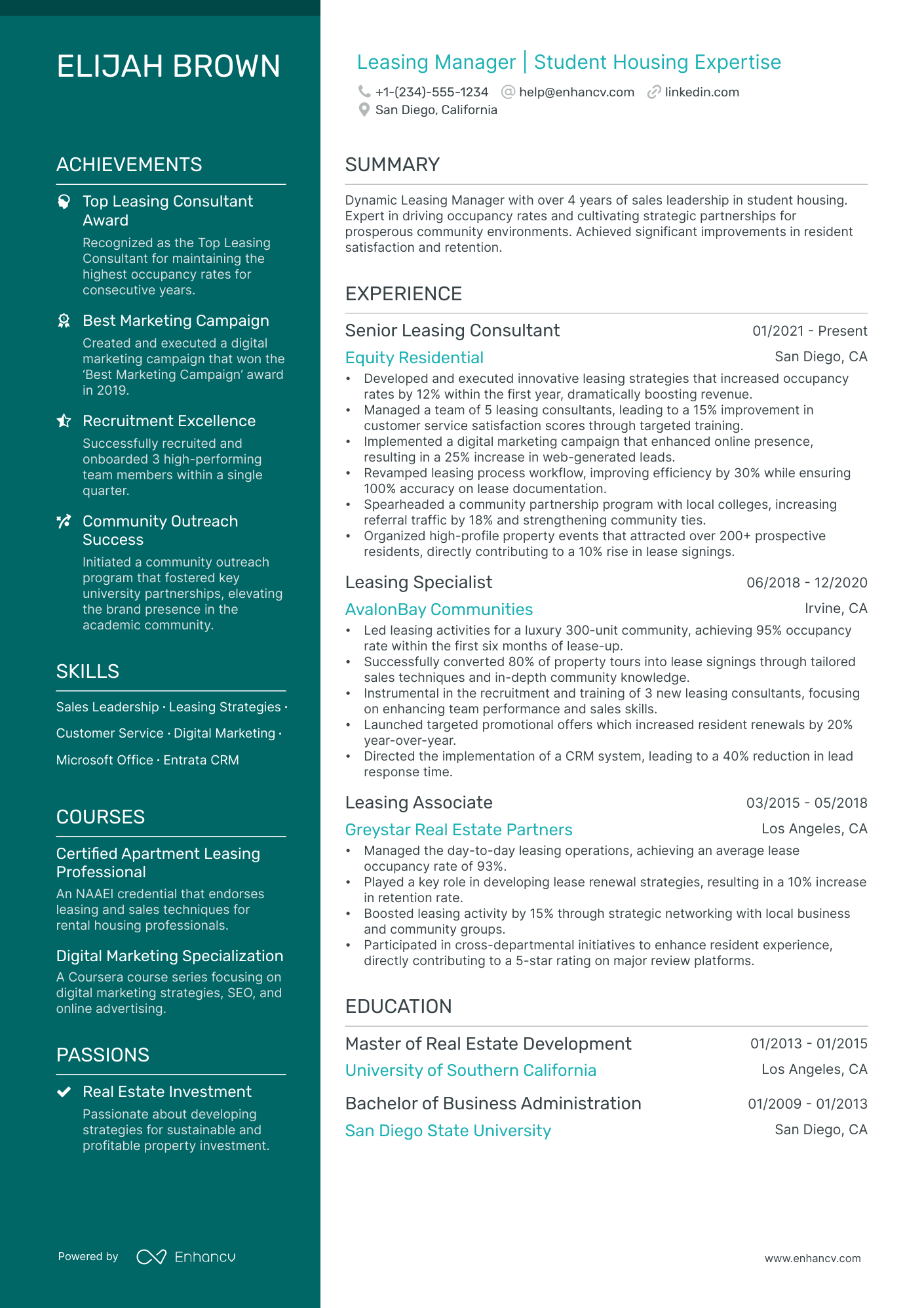As a leasing manager, you may find it challenging to articulate your intricate knowledge of property laws and client management on a resume. Our guide will help you streamline this information into compelling bullet points that will catch the eye of potential employers.
- The most effective leasing manager resume samples, reflecting on experience and skills.
- +10 simple, yet impactful methods to tailor your leasing manager resume to the job advert.
- Using your professional achievements as the North Star to your unique value as a leasing manager candidate.
- 'No one cares about your education nowadays …' Let's prove this statement wrong with the best-kept industry secrets to your education and certifications.
If the leasing manager resume isn't the right one for you, take a look at other related guides we have:
- Telesales Representative Resume Example
- Retail Assistant Store Manager Resume Example
- Regional Sales Director Resume Example
- Sales And Marketing Executive Resume Example
- Branch Sales Manager Resume Example
- Corporate Sales Manager Resume Example
- Retail Operations Manager Resume Example
- Saleswoman Resume Example
- Enterprise Sales Resume Example
- Retail Director Resume Example
How to style your leasing manager resume: layout and format
When creating your leasing manager resume, have you ever wondered how long it should be? Experts point out that it should be between one and two pages. Choose the longer format, if you happen to have over a decade of relevant experience. What is more, resume formats play a crucial role in presenting your experience. Use the:- Reverse-chronological resume format to highlight your experience;
- Functional skill-based resume format if you have less experience and want to focus on skills;
- Hybrid resume format to guide recruiters through both your experience and skills.
- Make sure your headline is simple and includes the job you're applying for or your current role, an abbreviation of a certificate you have, or even your professional area of interest;
- Always tailor your leasing manager resume to the role you're applying for by matching job requirements to your experience via different resume sections;
- Once you've created your resume, download it in PDF (unless otherwise specified). This is to ensure readability and that the layout remains fixed.
Upload & Check Your Resume
Drop your resume here or choose a file. PDF & DOCX only. Max 2MB file size.
PRO TIP
List your educational qualifications and certifications in reverse chronological order.
The six in-demand sections for your leasing manager resume:
- Top one-third should be filled with a header, listing your contact details, and with a summary or objective, briefly highlighting your professional accolades
- Experience section, detailing how particular jobs have helped your professional growth
- Notable achievements that tie in your hard or soft skills with tangible outcomes
- Popular industry certificates to further highlight your technical knowledge or people capabilities
- Education to showcase your academic background in the field
What recruiters want to see on your resume:
- Proven track record of successfully leasing residential or commercial properties, including meeting or exceeding leasing targets.
- Experience with property management software and CRM systems, demonstrating strong technical skills and an ability to analyze leasing trends and generate reports.
- Effective communication and interpersonal skills, with an emphasis on building strong relationships with tenants, stakeholders, and team members.
- Demonstrated knowledge of leasing regulations, fair housing laws, and property marketing strategies specific to the real estate industry.
- Strong negotiation skills and ability to close leasing agreements that are profitable and compliant with company guidelines and legal requirements.
Advice for your leasing manager resume experience section - setting your application apart from other candidates
Your resume experience section needs to balance your tangible workplace achievements with job requirements.
The easiest way to sustain this balance between meeting candidate expectations, while standing out, is to:
- Select really impressive career highlights to detail under each experience and support those with your skills;
- Assess the job advert to define both the basic requirements (which you could answer with more junior roles) and the more advanced requirements - which could play a more prominent role through your experience section;
- Create a separate experience section, if you decide on listing irrelevant experience items. Always curate those via the people or technical skills you've attained that match the current job you're applying for;
- Don't list experience items from a decade ago - as they may no longer be relevant to the industry. That is, unless you're applying for a more senior role: where experience would go to demonstrate your character and ambitions;
- Define how your role has helped make the team, department, or company better. Support this with your skill set and the initial challenge you were able to solve.
Take a look at how real-life leasing manager professionals have presented their resume experience section - always aiming to demonstrate their success.
- Handled lease-up of a new 300-unit luxury apartment complex, achieving 95% occupancy within the first 9 months of opening.
- Developed comprehensive digital marketing strategy resulting in a 40% increase in online inquiries and a 25% growth in lease conversions.
- Negotiated and administered over 150 commercial leases with national retailers, enhancing tenant mix and increasing long-term revenue stability.
- Spearheaded market analysis and lease negotiations for a portfolio of 25 commercial properties, increasing overall portfolio value by 20%.
- Implemented tenant retention programs that decreased turnover by 15%, thereby maintaining high occupancy rates and minimizing revenue loss.
- Collaborated with cross-functional teams to oversee a $10 million property renovation project, improving the leasing appeal and commanding higher rents.
- Managed the fulfillment of leasing contracts for over 500,000 square feet of office space with a 98% renewal rate by building strong relationships with major tenants.
- Streamlined lease administration processes, reducing paperwork and processing time by 30% through the implementation of a new lease management software.
- Coordinated with legal, finance and construction departments to ensure compliance with all lease requirements, avoiding any potential legal issues.
- Orchestrated the leasing operations for a portfolio of 15 apartment complexes, totaling over 2,000 units with a consistent 97% occupancy rate.
- Developed and executed targeted tenant acquisition strategies that expanded market reach and attracted high-value tenants.
- Successfully remediated tenant disputes and grievances, maintaining a high level of tenant satisfaction and reducing legal overhead by 20%.
- Directed the strategic planning and execution of a multi-phase lease-up for a new mixed-use development with an accelerated timeline, fully leasing space 6 months ahead of projections.
- Formulated a dynamic tenant mix strategy that diversified portfolio risk and maximized rental income by selecting the optimal balance of retail, office, and residential tenants.
- Leveraged industry relationships to attract high-profile tenants, raising the property's market profile and increasing competitive positioning.
- Exceeded leasing target goals by 10% annually, through proactive networking and in-depth competitor analysis, leading to successful negotiations that benefited property revenue.
- Facilitated lease transactions and approvals for over 700,000 square feet of retail space across multiple properties, optimizing the leasing cycle and improving time-to-market.
- Introduced and marketed a new eco-friendly office space initiative, which attracted a diverse array of prospective tenants focused on sustainability and corporate responsibility.
- Improved leasing efficiency by establishing clear communication channels with prospective tenants, reducing average vacant time per unit from 60 to 30 days.
- Launched a tenant satisfaction survey that informed a series of property improvements, increasing lease renewals by over 10% within one fiscal year.
- Designed a broker incentive program to enhance property visibility and tenant quality, resulting in a 15% increase in premium lease agreements.
- Managed leasing activities across a diverse region of 50+ properties, consistently achieving top performance in revenue generation and tenant satisfaction metrics.
- Revitalized underperforming assets by executing repositioning strategies, including implementing cost-effective renovations and targeted marketing campaigns.
- Fostered collaborative relationships with local business communities to create mutually beneficial partnerships and stimulate economic growth within the portfolio's vicinity.
Quantifying impact on your resume
- Detail the number of lease agreements you successfully negotiated and executed to showcase your competencies in deal closing.
- List the percentage by which you increased occupancy rates to demonstrate your effectiveness in tenant acquisition.
- Include the exact figure of revenue generated through new leases to reflect your ability to drive financial results.
- Mention the amount of rentable square footage you manage to provide a sense of the scale of your responsibilities.
- Specify the rate of lease renewals you achieved to highlight tenant satisfaction and retention skills.
- State the number of tenant disputes you resolved to show conflict management and customer service strengths.
- Quantify any cost savings achieved through vendor negotiations or operational efficiencies to illustrate your fiscal prudence.
- Report on the customer satisfaction scores or Net Promoter Scores (NPS) from tenants to underline your commitment to tenant experience.
Action verbs for your leasing manager resume
No relevant experience - what to feature instead
Suppose you're new to the job market or considering a switch in industry or niche. In such cases, it's common to have limited standard professional experience. However, this isn't a cause for concern. You can still craft an impressive leasing manager resume by emphasizing other sections, showing why you're a great fit for the role:
- Emphasize your educational background and extracurricular activities to demonstrate your industry knowledge;
- Replace the typical experience section with internships or temporary jobs where you've gained relevant skills and expertise;
- Highlight your unique skill set, encompassing both technological and personal abilities;
- Showcase transferable skills acquired throughout your life and work experiences so far.
Recommended reads:
PRO TIP
If you happen to have some basic certificates, don't invest too much of your leasing manager resume real estate in them. Instead, list them within the skills section or as part of your relevant experience. This way you'd ensure you meet all job requirements while dedicating your certificates to only the most in-demand certification across the industry.
Key hard skills and soft skills for your leasing manager resume
At the top of any recruiter leasing manager checklist, you'd discover a list of technical competencies, balanced with personal skills.
Hard or technical skills are your opportunity to show how you meet the essential responsibilities of the role. The ability to use a particular job-crucial technology or software would also hint to recruiters whether you'd need a prolonged period of on-the-job training - or you'd fit right in the job.
But to land your dream role, you'd also need to demonstrate a variety of soft or people resume skills . Employers care about soft skills as they show how each candidate would fit into the team and company culture.
Both types of skills are specific and to best curate them on your resume, you'd need to:
- Create a skill section within which you showcase your hard and soft skills and present how they help you succeed.
- List specific examples of projects, tasks, or competitions, within which your skill set has assisted your results.
- Soft skills are harder to measure, so think about situations in which they've helped you thrive. Describe those situations concisely, focusing on how the outcome has helped you grow as a professional.
- Metrics of success - like positive ROI or optimized workplace processes - are the best way to prove your technical and people skills.
Take a look at some of leasing manager industry leaders' favorite hard skills and soft skills, as listed on their resumes.
Top skills for your leasing manager resume:
Property Management
Lease Negotiation
Financial Analysis
Marketing
Legal Compliance
Sales
Customer Relationship Management (CRM)
Real Estate Knowledge
Contract Management
Data Analysis
Communication
Negotiation
Leadership
Customer Service
Problem Solving
Time Management
Attention to Detail
Teamwork
Adaptability
Organization
PRO TIP
Bold the names of educational institutions and certifying bodies for emphasis.
Certifications and education: in-demand sections for your leasing manager resume
Your academic background in the form of certifications on your resume and your higher degree education is important to your application.
The certifications and education sections pinpoint a variety of hard and soft skills you possess, as well as your dedication to the industry.
Add relevant certificates to your leasing manager resume by:
- Add special achievements or recognitions you've received during your education or certification, only if they're really noteworthy and/or applicable to the role
- Be concise - don't list every and any certificate you've obtained through your career, but instead, select the ones that would be most impressive to the role
- Include the name of the certificate or degree, institution, graduation dates, and certificate license numbers (if possible)
- Organize your education in reverse chronological format, starting with the latest degree you have that's most applicable for the role
Think of the education and certification sections as the further credibility your leasing manager resume needs to pinpoint your success.
Now, if you're stuck on these resume sections, we've curated a list of the most popular technical certificates across the industry.
Have a look, below:
The top 5 certifications for your leasing manager resume:
- Certified Property Manager (CPM) - Institute of Real Estate Management
- Certified Apartment Manager (CAM) - National Apartment Association
- Accredited Residential Manager (ARM) - Institute of Real Estate Management
- Accredited Commercial Manager (ACoM) - Institute of Real Estate Management
- Senior Professional of Property Management (SPPM) - American Management Association
PRO TIP
Mention specific courses or projects that are pertinent to the job you're applying for.
Recommended reads:
Deciding between a resume summary or objective for your leasing manager role
Understanding the distinction between a resume summary and an objective is crucial for your leasing manager resume.
A resume summary, typically three to five sentences long, offers a concise overview of your career. This is the place to showcase your most pertinent experience, key accomplishments, and skills. It's particularly well-suited for those with professional experience relevant to the job requirements.
In contrast, a resume objective focuses on how you can add value to potential employers. It addresses why they should hire you and outlines your career expectations and learning goals. Therefore, it's ideal for candidates with less experience.
In the following section of our guide, explore how resume summaries and objectives differ through some exemplary industry-specific examples.
Resume summaries for a leasing manager job
- With a decade of successful lease negotiations, portfolio management, and a track record of achieving 95% occupancy rates, this seasoned leasing manager excels in driving revenue growth and property performance. Expertise in commercial real estate, adept at market analysis, and strategic development of leasing campaigns tailored to community needs.
- Distinguished professional with 15+ years in high-end retail management, adept at pivoting skills to the dynamic world of property leasing. Proficient in customer relationship management and sales, desires to apply strong negotiation skills to maximize occupancy and enhance tenant satisfaction in residential properties.
- Career paramedic with over 20 years of service seeking to transfer honed problem-solving and communication skills into the leasing management sector. Known for quick decision-making and empathy, ready to ensure tenant safety and ensure compliance with building regulations while fostering a community-centric environment.
- Driven finance graduate eager to capitalize on a comprehensive understanding of the economic market and financial principles in a leasing management context. Keen to apply analytical prowess to optimize leasing strategies, enhance tenant relations, and contribute to the sustained profitability of a dynamic real estate portfolio.
- Dynamic individual with 7 years of experience in telecommunications sales management, eager to apply robust contract negotiation abilities, and persuasive communication skills to the real estate leasing sector. Committed to implementing innovative tenant attraction strategies and boosting property visibility in competitive markets.
- Ambitious, freshly graduated urban planner aspiring to specialize in leasing management, brings a unique perspective on space optimization and urban development trends. Passionate about fostering sustainable and thriving residential communities to drive lease signings and ensure overall tenant contentment.
More sections to ensure your leasing manager resume stands out
If you're looking for additional ways to ensure your leasing manager application gets noticed, then invest in supplementing your resume with extra sections, like:
These supplementary resume sections show your technical aptitude (with particular technologies and software) and your people skills (gained even outside of work).
Key takeaways
- Your resume layout plays an important role in presenting your key information in a systematic, strategic manner;
- Use all key resume sections (summary or objective; experience; skills; education and certification) to ensure you’ve shown to recruiters just how your expertise aligns with the role and why you're the best candidate;
- Be specific about listing a particular skill or responsibility you've had by detailing how this has helped the role or organization grow;
- Your personality should shine through your resume via the interests or hobbies, and strengths or accomplishments skills sections;
- Certifications go to provide further accreditation to your technical capabilities, so make sure you've included them within your resume.





